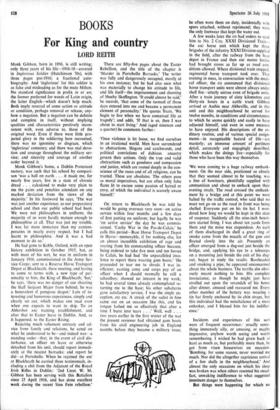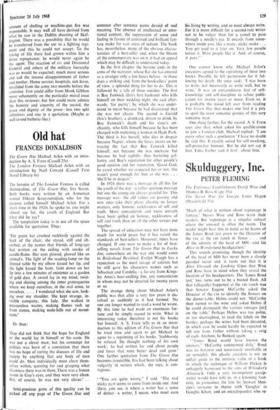For King and country BOOKS
LORD REITH
Monk Gibbon, born in 1896, is still writing; only three years of his life-1916-18--covered in Inglorious Soldier (Hutchinson 70s), with three pages pre-1916; a fractional auto- biography. And 'inglorious' for this soldier is as false and misleading as for the mute Milton. No standard significance in prefix in or un; the former preferred for words of Latin origin, the latter English—which doesn't help much. Both imply reversal of some action or attitude or condition, perhaps removal or release, any- how a negation. But a negation can be definite and complete in itself, without implying qualities and characteristics positively incon- sistent with, even adverse to, those of the original word. Even if there were little pro- jected glory in the soldiering here recounted, there was no ignominy or disgrace, which 'inglorious' connotes; and there was real devo- tion and courage throughout the military ser- vice; and sincerity and courage of another order beyond it.
Monk Gibbon's home, a Dublin Protestant rectory, was such that his school by compari- son 'was a hell on earth . . . it made me, for nearly five years, live in a state of chronic dread . . . calculated to make very plain to me the pains and penalties attendant on any marked deviation from the views of the majority.' In his foreword he says, The war was just another experience, as our preparatory school and then our public school had been. We were not philosophers in uniform; the majority of us were hardly mature enough to philosophise at all. That was just my trouble. I Was far more immature than my contem- poraries in nearly every respect, but I had learnt to philosophise. And it was a bad moment to do so.'
He had gone to Keble, Oxford, with an open history exhibition in October 1915, but, as with most of his sort, he was in uniform in January 1916, commissioned in the Army Ser- vice Corps; sent to a Reserve Horse Transport Depot at Blackheath, there meeting, and having to come to terms with, a new type of per- sonality to him, the King of Blackheath; 'but,' he says, 'there was no danger of our shooting the Staff Serjeant Major from behind; he was a benevolent if pompous despot.' Lots of in- teresting and humorous experiences, simply and clearly set out, which makes one read even when one expects to want to skip. To an Aldershot ASC training establishment, and after that to Easter leave in Dublin. And, as it happened, to the Easter Rising.
Rejecting much vehement entreaty and ad- vice from family and relations, he acted on what he understood to be—and indeed was—a standing order—that, in the event of civil dis- turbance, an officer on leave or otherwise detached from his unit, should report immedi- ately at the nearest barracks; and report he did—at Portobello. When he rejoined the ASC at Blackheath he carried three testimonials, in- cluding a chit from the Adjutant of the Royal Irish Rifles in Dublin: '2nd Lieut. W. M. Gibbon has been serving with this Battalion since 25 April 1916, and has done excellent work during the recent Sinn Fein rebellion.' There are fifty-five pages about the Easter Rebellion, and the title of the chapter is 'Murder in Portobello Barracks.' The writer was fully and dangerously occupied, mostly at his own instance; but he had also seen what was materially to change his attitude to life, and life itself—the imprisonment and shooting of Sheehy Skeffington. 'It could almost be said,' he records, 'that some of the turmoil of those days entered into me and became a permanent element of personality.' He quotes Yeats, 'We begin to live when we have conceived life as tragedy'; and adds, 'If that is so, then I was about to start living.' And (aged nineteen and a quarter) he comments further: 'Once violence is let loose, we find ourselves in an irrational world. Men have surrendered to abstractions. Slogans and catchwords, and political convictions of dubious ancestry govern their actions. Only the true and valid abstractions such as goodness and compassion and justice, which are rooted deeply in the con- science of the races and of all religions, can be trusted. These are absolutes. The others pose as moral imperatives, but are often only false flares lit to excuse some passion of hatred or envy, of which the individual is scarcely aware himself.'
On return to Blackheath he was told he would be going overseas very soon—on active service within four months and a few days of first putting on uniform; but legally he was 'on active service' the day he was commis- sioned. 'Cushy War in the Pas-de-Calais,' he calls this period—Base Horse Transport Depot in Havre—memorable, if for nothing else, for an almost incredible exhibition of rage and roaring from his commanding officer because, being ordered to take five men and ten horses to Calais, he had had 'the unparalleled inso- lence to report there wearing gum boots.' He proceeded to tear me to shreds. I was in- efficient; earning army and corps pay of an officer when I should normally be still a schoolboy; showed no interest in my work; he had several times already contemplated re- turning me to the base; his other subalterns gave satisfactory service, I was the single ex- ception, etc etc. A streak of the sadist in him came out on an occasion like this, and his tongue lashed me so effectively that after a time I burst into tears . . Well, well . . . two years earlier in the first winter of the war the present reviewer had obtained gum boots from his civil engineering job in England months before they became a military issue; be often wore them on duty, incidentally with spurs attached, without reprimand; they were the only footwear that kept the water out.
A few weeks later the co had orders to send him to No. 2 Coy. XXXI Divisional Train— the ASC horse unit which kept the three brigades of the infantry XXXI Division supplied in the field, after the railway from the base depot in France and then ASC motor lorries had brought stores as far up as road con- ditions allowed. Where divisional train stopped, regimental horse transport took over. That evening in mess, in conversation with the medi- cal officer, the co announced that divisional horse transport units were almost always under shell fire—utterly untrue even of brigade units. After a train journey of sixty kilometres and thirty-six hours in a cattle truck Gibbon arrived at Authie near Abbeville, and in this unit and this neighbourhood he served for twelve months, in conditions and circumstances to which he seems quickly and easily to have adjusted himself, and even in some measure to have enjoyed. His descriptions of the or- dinary routine, and of various special assign- ments—in recognisable hazard of life—are masterly; an immense amount of pertinent dptail, accurately and engagingly described, which makes the doings live—especially for those who have been this way themselves.
'We were coming to a huge railway embank- ment. On the near side, positioned so closely that they seemed almost to be touching, was a line of howitzers, plentifully supplied with ammunition and about to embark upon their evening strafe. The road crossed the embank- ment by a bridge and at this point we were halted by the traffic control, who said that we must not go on as the road in front was being shelled. Everyone put on his tin hat. I won- dered how long we would be kept in this state of suspense. Suddenly all the nine-inch howit- zers started firing. I was about ten yards from them and the noise was stupendous. As each of them discharged its shell a great ring of smoke came from the muzzle of the gun and floated slowly into the air. Presently an officer emerged from a dug-out just beside the bridge, and, applying his eye to a telescope on a mounting just beside the exit of his dug- out, began to study the results. Bareheaded and smoking a pipe, he appeared unconcerned about the whole business. The terrific din obvi- ously meant nothing to him. His complete insouciance, as though he might just have strolled out upon the verandah of his home after dinner, amused and reassured me. Every other member of the battery was wearing a tin hat firmly anchored by its chin straps, but this individual had the nonchalance of a mere onlooker, and I blessed him for his indiffer- ence.'
Incidents and experiences of this sort were of frequent occurrence : usually some- thing immensely silly, or amusing, or maybe impressive, anyhow worth seeing and worth remembering. I wished he had given back at least as much as, but preferably more than, he got from vixen housewives on occasion. 'Bombing, for some reason, never worried me much. Nor did the altogether capricious arrival of a few shells in the neighbourhood.' And almost the only occasions on which his sleep was broken was when others resented his stead- fast, unwaking indifference to what suggested imminent danger to themselves.
But things were happening for which no amount of shelling or machine-gun fire was responsible. It may well all have derived from what he saw, in the Dublin shooting of Skef- fington. There was a possibility that he would be transferred from the ASC to a fighting regi- ment and this he could not accept. To the taking of life there had grown within him a fierce repugnance; he would never again be the agent. The reaction of co and Divisional General and others of the military hierarchy was as would be expected; much more serious and sad the intense disappointment of father and mother. Home service; hospitals, sick leave, invalided from the army two months before the armistice. Few could differ from Monk Gibbon more vehemently on the particular moral issue than this reviewer; but few could more admire the honesty and sincerity of the record, the grace and dignity of the prose—less two split infinitives and one in a quotation. (Maybe as well to end bathetic-like.)







































 Previous page
Previous page